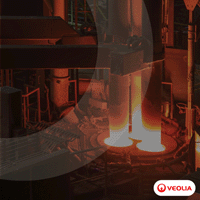New NLMK Blast Furnace Enters Hot Testing Phase
08/31/2011 - NLMK announced the launch of hot testing for its new 3.4 million tonne/year Blast Furnace No. 7, the first blast furnace to be built in Russia in the last 25 years.
NLMK announced the launch of hot testing for its new 3.4 million tonne/year Blast Furnace No. 7 (BF-7).
NLMK’s BF-7 is the first blast furnace to be built in Russia in the last 25 years, and the key project to date under the company’s Technical Upgrade Program. NLMK has invested RUR43 billion (including VAT) into the project including construction of the new blast furnace, a recovery co-generation plant and the furnace infrastructure.
The new blast furnace incorporates innovative solutions from Russian and international engineers, making it one of the best examples of efficient international cooperation in recent years. A number of technical solutions are innovative not only for Russia, but also globally. NLMK’s new 150 MW recovery co-generation plant, constructed together with BF-7, has begun to receive by-product blast furnace gases and already has generated its first electric energy.
As benchmarked against its closest international peers, the company says that BF-7 will display better labor efficiency, minimum fuel consumption, and better product quality. The furnace also features the most advanced environmental technologies available, including highly efficient de-dusting systems, closed water cycle, and maximum recycling of recoverable resources for power generation. All slag from blast furnace processes will be reprocessed into crushed stone for use in construction.
As benchmarked against its closest international peers, the company says that BF-7 will display better labor efficiency, minimum fuel consumption, and better product quality. The furnace also features the most advanced environmental technologies available, including highly efficient de-dusting systems, closed water cycle, and maximum recycling of recoverable resources for power generation. All slag from blast furnace processes will be reprocessed into crushed stone for use in construction.
Stroitelno-montazhniy Trest NLMK LLC (NLMK’s Construction and Assembly Unit) served as the general contractor for the project. Lipetsky Gipromez OAO served as the chief designer and PAUL WURTH was the leading metallurgical equipment manufacturer, responsible for the design, delivery of main process equipment, assembly supervision, commissioning, and performance tests.
Burden and fuel charging operations for the new blast furnace were completed Tuesday, August 30. Air heated to 800˚C air is now being blown into the furnace to prepare it for smelting operations, and the blast temperature will later be increased to 1250˚C. The first tonne of pig iron is scheduled to be produced in September. Once commissioned, the BF-7 team will comprise 268 employees. To date, 72 skilled workers have been transferred from other blast furnace production facilities, and 196 new employees have been hired.
Burden and fuel charging operations for the new blast furnace were completed Tuesday, August 30. Air heated to 800˚C air is now being blown into the furnace to prepare it for smelting operations, and the blast temperature will later be increased to 1250˚C. The first tonne of pig iron is scheduled to be produced in September. Once commissioned, the BF-7 team will comprise 268 employees. To date, 72 skilled workers have been transferred from other blast furnace production facilities, and 196 new employees have been hired.
Following commissioning of the new blast furnace, the Lipetsk plant’s pig iron capacity will grow by 30%, marking the most important single unit increase since the Soviet times. The new blast furnace will enable the company to expand its annual BOF steel capacity at Lipetsk by 36%, to 12.4 million tonnes.



.png?lang=en-US&ext=.png)




